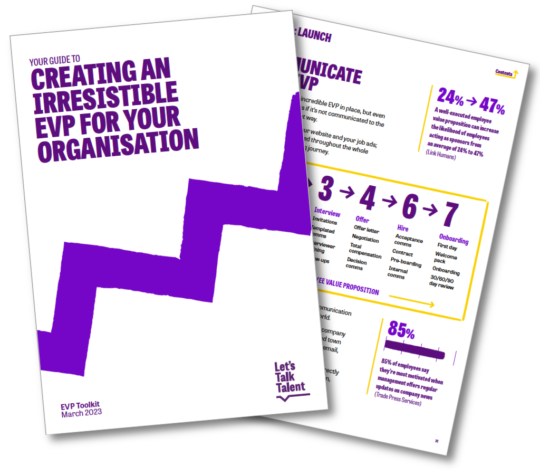Using your EVP to attract and retain the best talent to your business
HR teams have not had an easy time of it lately, and it looks like there might still be a few challenges ahead when it comes to recruitment. But surely, a looming recession means some relief from the ongoing skills shortage, right? Not quite.
At Let’s Talk Talent, we believe resignations could carry on, as people everywhere continue to review their priorities and make decisions aimed at reaching their personal goals. Businesses that assume the tougher economic climate will lead to employees hunkering down and staying in their current roles could be surprised.
Which means now is not the time to ease off the gas when it comes to your recruitment efforts!
The good news is that there are plenty of ways businesses can adapt their recruitment strategy and embrace the opportunities presented by the current labour market. We have already described some of the tools available in a previous blog article (read about the 6 things to add to your HR strategy in 2023).
But when it comes to ramping up your recruitment efforts, your Employee Value Proposition (EVP) is one of your best assets. Having a kickass EVP is crucial for anyone wishing to attract future talent to their business, and not only retain current employees, but turn them into powerful advocates.
Here is a crash course on what a great EVP entails, and how it can make a huge difference to your business.
What is an Employee Value Proposition (EVP)?
Your EVP is your shop window. It tells people outside your organisation why you exist and what it’s like to work with you. It also demonstrates the kind of opportunities available to them should they decide to join you. An EVP allows candidates to determine whether they see themselves reflected in your organisation.
“It’s really about expressing WHY people work for you. It’s the contract between the business and its employees. It states what the organisation can offer its people, and what employees will be expected to do in return,” says Jo Taylor, MD at Let’s Talk Talent.
This contract should include as much detail as possible. Candidates looking at you as a potential employer should have a clear idea of what they will be doing, and the behaviours that are valued and rewarded within the organisation.
But more than this, they should have a clear idea of where they’ll be expected to work, the hours they’ll have to keep, the benefits that come with the role, and everything else that allows them to determine if working for you would fit their lifestyle.
Some of this will be available on your website, on your careers portal, on your social platforms, and anywhere people might find out information about your organisation. “Your EVP should capture your uniqueness, warts and all,” adds Jo.
Who owns your EVP?
Is crafting a compelling Employee Value Proposition a marketing job? An HR responsibility? Should it be up to the leadership team?
All of the above! Your EVP is everybody’s responsibility. It is a part of your culture, and everyone in the business will have a say in it.
It’s true that the customer-facing communications tools that showcase your EVP will predominantly fall under your marketing team’s remit. This includes your careers and company website and your social media channels. These all display your EVP to the world and show what it’s like to work with you.
However, don’t forget that your staff (past and present) will also leave reviews on review sites such as Glassdoor, and any discrepancies between what you put out into the world and the reality of working with you will be highlighted.
Make sure your EVP presents an image of your company that is honest, transparent, and aligned from the inside out.
Why do you need an EVP?
Helping you recruit the right talent
It’s not a secret: it’s a candidate’s market. Businesses everywhere are struggling to attract new talent.
Your EVP is a key asset that can be used to optimise your entire recruitment process. It defines how managers talk about your business during interviews, shapes the way you write job adverts, and even influences the online recommendations left by current and past employees.
Making sure each of these touchpoints is a positive, joined up experience that shows the world everything you have to offer can be a powerful factor in a candidate’s decision process.
Helping you with staff retention
It’s important to note that your EVP shouldn’t be solely focused on attracting new people. It’s also about creating brand advocates and having a talent pool that is proud to work within your organisation.
This kind of brand advocacy not only generates higher staff retention rates (and therefore lower churn costs), it also ensures that future candidates are more likely to stay in the business.
By attracting employees who are aligned with the purpose and mission of your organisation, you ensure anyone you recruit is more likely to stick around, and in turn to attract other like-minded candidates.
When should you develop an EVP?
The truth is, you already have one. You may not know it, but your internal culture, your values, your mission, your employee benefits, your career development initiatives… All of these already make up your EVP. The good news? You can always work on making it better!
Your EVP is something that evolves and grows with you, and gets more sophisticated as you develop it. It comes through at every stage of your employee experience (EE), from the first time a candidate becomes aware of you, through to the day they leave the business.
Your EVP is what joins the recruitment, onboarding and career development stages together to ensure your people’s experience is consistent, and meets expectations.
However, just because you already have an EVP doesn’t mean that you should stop worrying about it! Presenting a compelling image of your organisation to the world doesn’t just happen on its own.
Have a look at your various channels, read reviews on Glassdoor, and ask your internal audiences what it’s like to work with you, and use this knowledge to improve your EVP.
Pro tip: start this exercise before recruitment needs become an operational issue.
What are the components of an Employee Value Proposition (EVP)?
A clear EVP is much more than just a shiny careers website. It includes everything that will allow prospective employees to determine whether or not they see themselves reflected in your organisation, including:
- The type of work they’ll be doing (role description, expected tasks, how they can contribute to reaching organisational goals)
- The purpose of the business (mission and values)
- Who they will be reporting into (leadership and managerial team)
- The community they’ll be a part of (team and the wider network)
- The processes in place (location, flexible hours, dress code, salary brackets, promotion requirements, holidays, pension, and everything else in between)
- The career opportunities available (learning and development, internal mobility)
Each of the touchpoints between your people and your organisation form part of your EVP, and HR departments should ensure these work together to clearly illustrate what it’s like to work for you.
How do you go about creating your EVP?
“It’s not about reinventing yourself completely or putting out lots of gimmicky messages,” says Jo. “It’s about being honest and making sure your EVP rings true.”
This may require addressing some of the issues you are already aware of. Look at data and find out where you can make small incremental changes to improve your employee experience.
And if there are some important issues that could make potential candidates think twice about working with you, don’t try and bury them. Admit to what was done wrong and set out to correct the situation.
Getting started with your EVP
Now is not the time to sit back and relax in the hope that the wave of resignations has finally crashed. Employees will continue to look for employment opportunities that are aligned with their values and match their lifestyle.
How can you ensure those looking at you as a potential employer take the next step towards joining your business?
We all know recruitment is a fast paced game: as you work hard to find talent and fill skills gaps, remember you are talking to humans. Constantly look for ways to improve their experience and make it stand out from the crowd.
Start with data. Review your metrics, talk to your people, get feedback from everyone, including candidates who pulled out of the recruitment process. Identify what’s working, and what’s not, and go from there.
Employers who are successful in their recruitment efforts will always be the ones who show care and empathy, and put their people at the core of everything they do.
If you would like some help crafting a kickass EVP, don’t hesitate to book a call with us. Otherwise, register for our free EVP WhatsApp course or enquire about our full paid-for EVP toolkit.
Related EVP resources:
- Buy our EVP Toolkit to help you get started [Paid Resource]
- Building an Employee Value Proposition (EVP) that attracts and retains top talent [Podcast]
- What makes a good EVP and who does them well? [Podcast]
- 5 trends in employee value proposition (EVP) for 2023 [Blog]
- 4 ways to write a winning Employee Value Proposition (EVP) [Blog]
- Employee Value Proposition (EVP) examples that work [Blog]
- Linking employee (EVP) and customer (CVP) value propositions [Blog]

